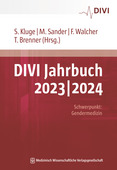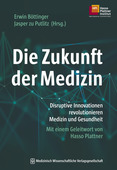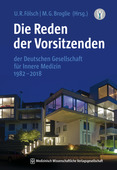Das DIVI Jahrbuch präsentiert ausgewählte State of the Art-Beiträge und brandaktuelle wissenschaftliche Arbeiten aus der gesamten Intensiv- und Notfallmedizin. <br /&g...

Clinical Evidence in Intensive Care
Aus dem Inhalt
The Systematic Review Group (SRG) is a new division of the research department of European Society of Intensive Care Medicine (ESICM). The aims of the SRG are to promote evidence based medicine in critical care, to enhance the role of systematic reviews and meta-analyses in everyday practice and to facilitate access to such evidence for clinicians.
It has been estimated that a health care professional would need to read 17-20 original articles every day in order to keep up-to-date in their field. Thus the role of systematic reviews in gathering the evidence, informing guidelines and helping professionals keep abreast of their field has been increasingly recognised. The ESICM Clinical Evidence in Intensive Care handbook was compiled with this in mind. 60 systematic reviews on topics directly relevant to critical care were selected. Most of the reviews are of high quality and published since 2009. Indeed, it is thought that a systematic review remains accurate for 2 years on average, and therefore has to be updated at the very least every other year.
For each of these SRs, we have provided the readers with a summary highlighting the context of the review, its main findings, review authors’ conclusions, problems and limitations, and advantages. In addition, we analysed the methodological quality of the systematic review on 11 items based on the AMSTAR (assessment of multiple systematic reviews) tool. For the majority of the systematic reviews, a forest plot of the primary or other relevant outcomes is included. Most of the reviews also have commentaries from experts in the field highlighting the validity and robustness of the data, whether or not they should translate into changes in routine practice, and what should be the next steps for research. Where relevant, additional information has been provided such as: details of recently completed trials or further references.
It has been estimated that a health care professional would need to read 17-20 original articles every day in order to keep up-to-date in their field. Thus the role of systematic reviews in gathering the evidence, informing guidelines and helping professionals keep abreast of their field has been increasingly recognised. The ESICM Clinical Evidence in Intensive Care handbook was compiled with this in mind. 60 systematic reviews on topics directly relevant to critical care were selected. Most of the reviews are of high quality and published since 2009. Indeed, it is thought that a systematic review remains accurate for 2 years on average, and therefore has to be updated at the very least every other year.
For each of these SRs, we have provided the readers with a summary highlighting the context of the review, its main findings, review authors’ conclusions, problems and limitations, and advantages. In addition, we analysed the methodological quality of the systematic review on 11 items based on the AMSTAR (assessment of multiple systematic reviews) tool. For the majority of the systematic reviews, a forest plot of the primary or other relevant outcomes is included. Most of the reviews also have commentaries from experts in the field highlighting the validity and robustness of the data, whether or not they should translate into changes in routine practice, and what should be the next steps for research. Where relevant, additional information has been provided such as: details of recently completed trials or further references.
Die Autoren / Herausgeber
Array
AMSTAR (assessment of multiple systematic reviews); Acute kidney injury; Acute respiratory failure; ARDS; Non-ARDS; Organ donation; Health technology; Infection; Neuro-intensive Care; Nutrition; metabolism; Outcomes; Paediatric intensive care; Sepsis; Trauma medicine; Emergency medicine

 Health Care Management
Health Care Management
 zur Übersicht
zur Übersicht












